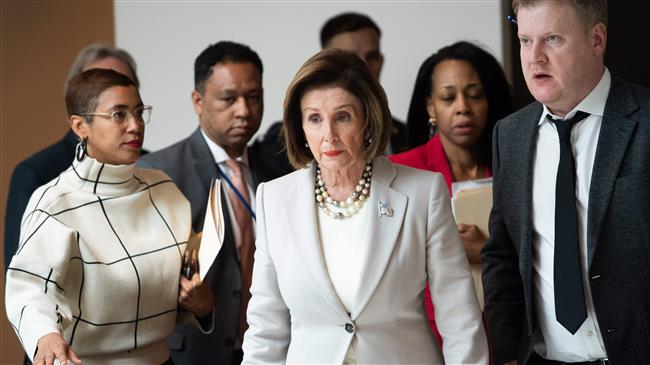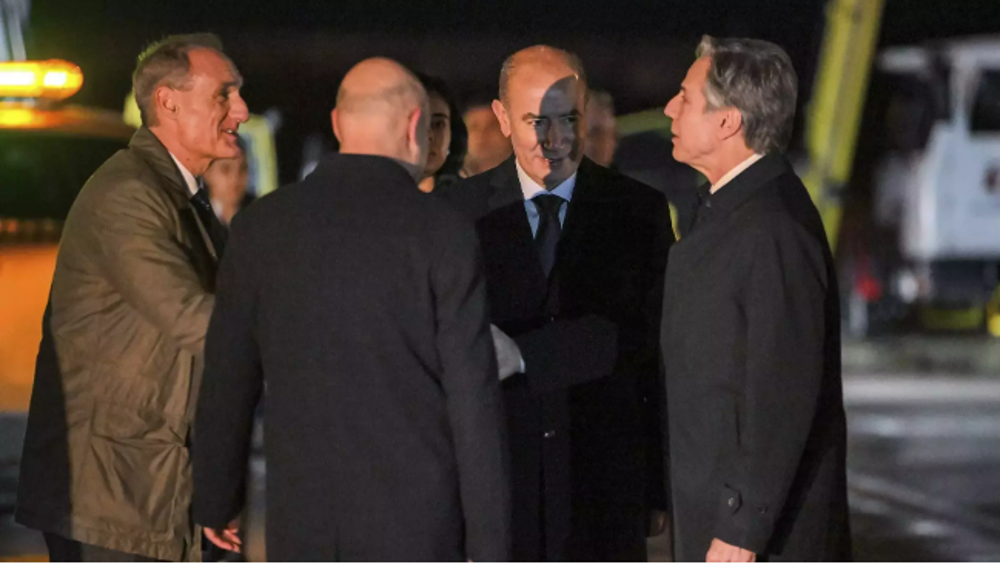Democrats lay out case for Trump impeachment probe, more key witnesses set to appear
Democrats on Monday laid out their case for the impeachment inquiry of President Donald Trump and pressed Republicans to stop supporting Trump by releasing a fact sheet and video they said expose Trump's efforts to secure victory in the 2020 presidential election with the assistance of Ukraine.
The releases "encapsulate all the evidence uncovered to date about the president's months-long pressure campaign to undermine the 2020 election and the extent to which he abused his power by using the levers of government to advance the scheme," according to the office of Nancy Pelosi, the speaker of the House of Representatives.
They also showed how Democrats may approach the charges, or articles of impeachment, they are expected to draw up at the conclusion of the probe. The articles of impeachment, if approved by the House, would then be sent to Senate for a trial on whether to remove Trump from office.
The Senate is controlled by Trump's fellow Republicans, who have shown little inclination toward removing him.
Democrats said their fact sheet and video show Trump "believes he is above the law" and that "House Republicans’ complicity and silence only serves to keep him there."
House Intelligence Chairman Adam Schiff has held hearings for the probe into whether Trump should be removed from office, mostly behind closed doors. Republicans have likened the process to a "star chamber," a secretive English judicial process used a hundred of years ago to target political enemies of the government.
The fact sheet, laid out in three parts and drawing from press reports and other publicly available information, alleges that Trump carried out a "shake down" of Ukraine, withholding aid while pushing for information on former Vice President Joe Biden, a potential rival in the 2020 election, and also enlisting senior officials to press Ukraine and cover up his actions.
Another round of crucial testimony in the probe is set for this week. The acting ambassador to Ukraine, who raised concerns that security aid was being withheld to apply improper political pressure, veteran State Department officer William Taylor and at least four other witnesses are the next to speak before congressional committees.
The fast-developing inquiry has cast a new cloud of legal troubles over Trump's presidency, contributing to unease among fellow Republicans at a time when some have already been critical of his abrupt decision to remove US troops from northeastern Syria.
Taylor, whose closed-door testimony is set for Tuesday, could be one of the most important witnesses yet. He is expected to be followed later in the week by a senior State Department diplomat, White House officials and a Pentagon Ukraine policy expert, according to an official working on the inquiry.
Taylor's text messages with US Ambassador to the European Union Gordon Sondland have surfaced as a central thread in the probe, which focuses on whether Trump withheld $391 million in US security aid to Ukraine earlier this year to get newly elected President Volodymyr Zelenskiy to investigate Biden and his son Hunter, and a discredited theory that Ukraine may have meddled in the 2016 US election.
At the center of the probe, which initially stemmed from a whistleblower's complaint, is a July 25 call in which Trump pressed Zelenskiy for his cooperation.
Trump has acknowledged many central facts of the call, maintaining that none of it amounted to wrongdoing or a demand for a "quid pro quo," a Latin phrase meaning a favor in exchange for a favor.
"This Scam going on right now by the Democrats against the Republican Party, and me, was all about a perfect phone call I had with the Ukrainian President," Trump said on Twitter on Sunday night. "He’s already stated, NO PRESSURE!"
'No quid pro quos'
Democratic lawmakers will be looking for Taylor to shed light on communications with Sondland, who testified last week.
"I think it’s crazy to withhold security assistance for help with a political campaign,” Taylor, the US charge d'affaires in Ukraine, said in a text to Sondland.
"The President has been crystal clear no quid pro quo's of any kind," Sondland responded by text after speaking to Trump.
Sondland said in written testimony, however, that Trump told senior US officials to deal directly with his personal lawyer, Rudy Giuliani, about US policy on Ukraine, raising concern that foreign policy was being outsourced to a private citizen.
Acting White House Chief of Staff Mick Mulvaney told reporters on Thursday that Trump's decision to withhold the aid to Ukraine was linked in part to his desire for an investigation by Kiev into a theory, debunked, that a Democratic National Committee computer server was held in Ukraine.
Mulvaney walked back the comments in a statement the same day and on Fox News on Sunday again denied a quid pro quo.
Senator Lindsey Graham, a Republican who frequently allies himself with Trump, told Axios it would require more evidence to persuade him to change his mind on impeachment.
"If you could show me that, you know, Trump actually was engaging in a quid pro quo, outside the phone call, that would be very disturbing," he said. He stressed, however, that from reading the contents of the call, it was "not a quid pro quo to me."
Due to testify in closed session on Wednesday are Philip Reeker, the acting assistant secretary of state for Europe, and Michael Duffey, associate director for national security programs at the White House Office of Management and Budget.
Deputy Assistant Secretary of State Laura Cooper, who oversees the Pentagon's Ukraine policy, and Alexander Vindman, a Europe adviser on the National Security Council, are scheduled to testify on Thursday, the official involved in the inquiry said. (Source: Reuters)
Relentless Israeli ceasefire violations justify need for self-defense: Lebanese MP
Tel Aviv tells Damascus Israeli forces will remain in occupied territory: Report
Dec. 22: ‘Axis of Resistance’ operations against Israeli occupation
‘Abhorrent’: Oxfam says only 12 trucks delivered aid in North Gaza since Oct.
VIDEO | Leader receives religious eulogists on Hazrat Fatima birth anniv.
Pope Francis slams Israel’s ‘machine-gunning’ of Gaza children
US hostage-taking of Iranian nationals violation of intl. law: Deputy FM
VIDEO | Carol Singers for Palestine on London’s Parliament Square











 This makes it easy to access the Press TV website
This makes it easy to access the Press TV website